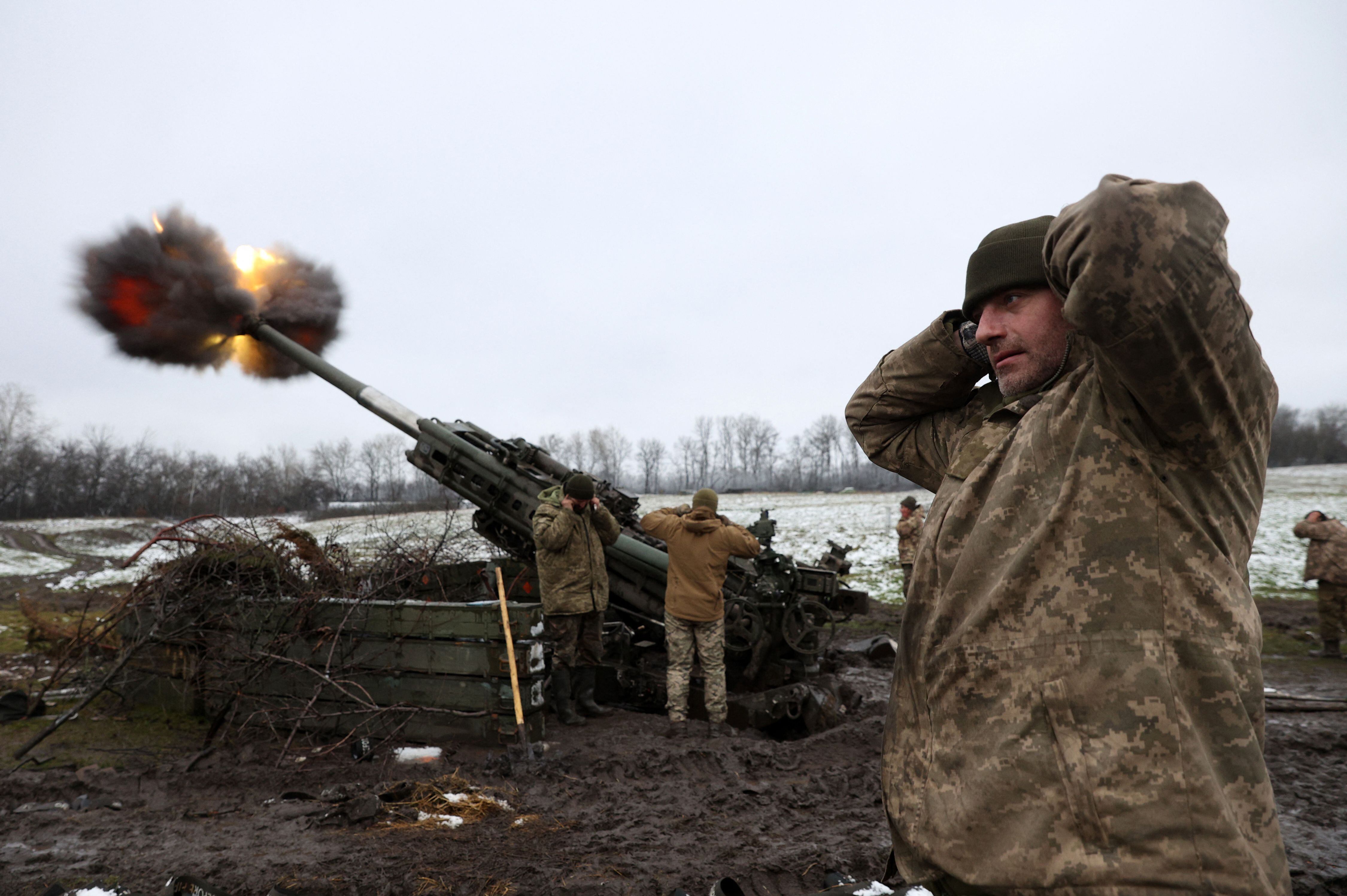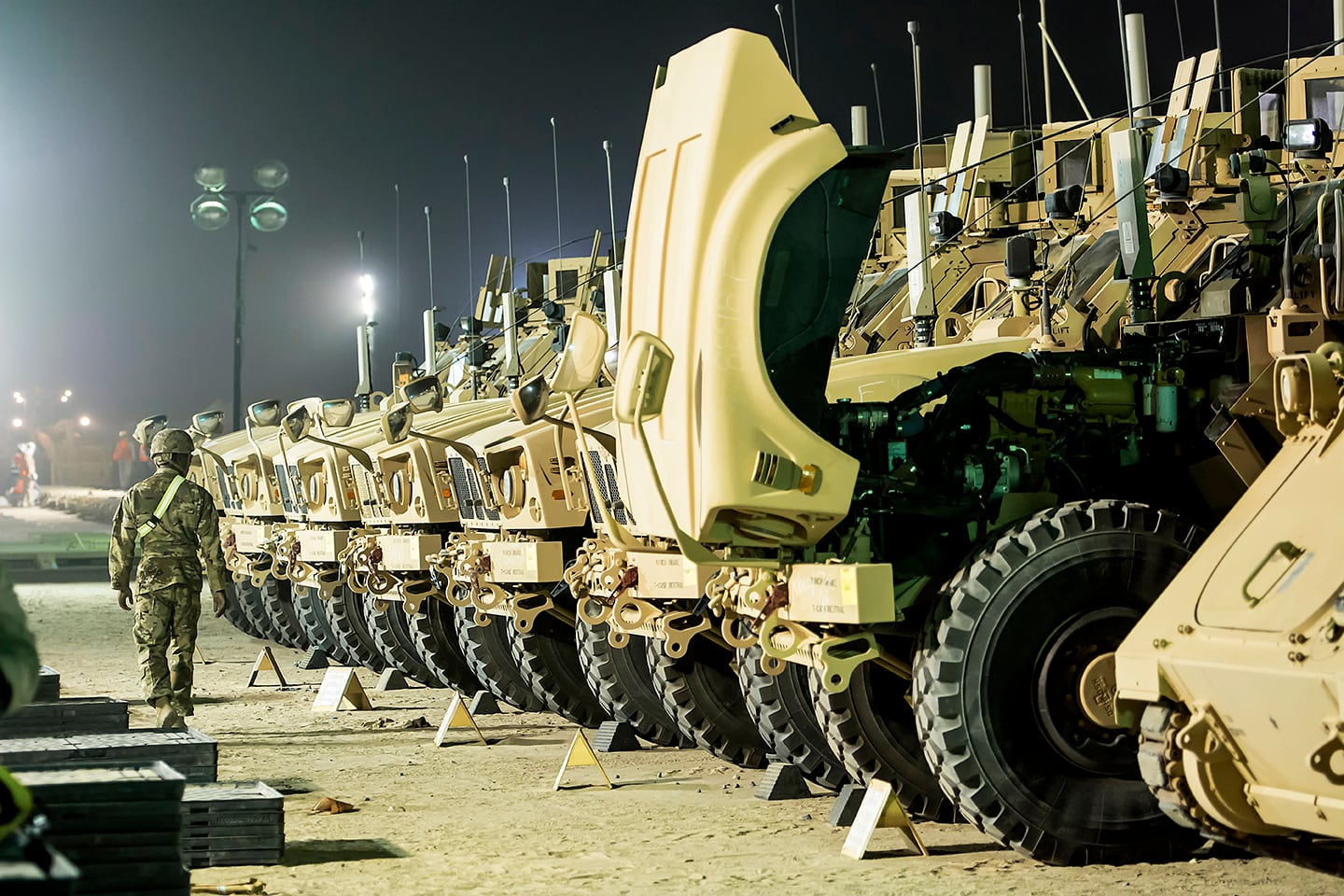This story has been updated to include the name of the contractor performing the maintenance work in Kuwait at the APS location.
WASHINGTON — Equipment drawn from the U.S. Army’s Kuwait-based pre-positioned stock bound for Ukraine was not ready for combat operations, the Pentagon’s inspector general has found.
During the inspector general’s audit of that pre-positioned stock area, the fifth of seven such locations around the world, “we identified issues that resulted in unanticipated maintenance, repairs, and extended leadtimes to ensure the readiness of the military equipment selected to support the Ukrainian Armed Forces,” the May 23 report stated.
All six of the M777 howitzers and 25 of 29 M1167 High-Mobility Multipurpose Wheeled Vehicles were not “mission ready” and required repairs before U.S. European Command could send the equipment to Ukraine.
By January 2023, the U.S. government used its drawdown authority 30 times in total to provide $18.3 billion in equipment and ammunition to Ukraine, which is fighting a Russian invasion.
Army pre-positioned stock, or APS, is meant to be kept at the highest level of readiness so that it can be used immediately in case of an emergency.
The inspector general issued the report mid-audit out of concern that “issues with poor maintenance and lax oversight of the [APS] equipment could result in future delays for equipment support provided to the Ukrainian Armed Forces,” the report read. “In addition, if U.S. forces needed this equipment, they would have encountered the same challenges.”
The 401st Army Field Support Battalion in Kuwait is responsible for overseeing contractor maintenance work, which includes issuing equipment. Army Materiel Command confirmed the contractor conducting the work at the site is Amentum, which is based in Chantilly, Virginia.
Hazardous howitzers
Because the battalion did not ensure the contractor was meeting its maintenance requirements for approximately 19 months on M777 howitzers, an Army Materiel Command senior representative from Kuwait issued a request for assistance, bringing in a U.S. Army Tank-automotive and Armaments Command mobile repair team from Anniston Army Depot, Alabama.
When the team arrived at Camp Arifjan in March 2022, the contractor provided a howitzer that it said was fully mission capable. But the weapon system was not maintained according to the standard technical manual, per the mobile repair team, and “ ‘would have killed somebody [the operator],’ in its current condition,” the report stated.

The team subsequently found that all six howitzers had operational issues. Four of the six howitzers had breech blocks improperly aligned with the rack gear, which prevented the breech from correctly locking. A breech not properly locked could result in an explosion that could kill the crew, the report noted.
Additionally, all six howitzers contained reused, old hydraulic fluid, which is not allowed because the fluid degrades over time and could lead to “disastrous results and malfunctions of critical systems,” the inspector general found.
The contractor paid the mobile repair team $114,000 for labor and travel expenses, according to the report.
As the howitzers were being prepared to leave Kuwait for shipment to Europe on June 21, 2022, one of the howitzers experienced a brake fire, likely due to the contractor not releasing the parking brake when moving it, according to the report, which cited a specialist with the mobile repair team. The contractor claimed it was likely due to leaking brake fluid, the report noted.
When the howitzers reached Poland for distribution to Ukraine, officials there said all six howitzers still had faults that made them non-mission capable, according to the report, including worn firing pins and issues with the firing mechanism. The repairs cost about $17,490 in labor and materials.
Officials said they were able to avoid delays in getting the howitzers to Ukraine, but the inspector general noted in the report the inadequate maintenance on the howitzers highlights the need to consider the time it would take to maintain and repair equipment coming from the APS site in Kuwait for Ukraine.
Tire troubles
Prior to August 2022, the 401st declared 28 of 29 Humvees as fully mission capable, but when it received an order to pull those out for Ukraine on Aug. 24, only three of the 29 were ready, the inspector general said.
Problems with the Humvees included dead batteries, inoperative lights, faulty gauges, damaged seat belts, broken door lock latches and fluid leaks, the report listed.
In order to meet the deadline to ship the equipment to Europe, the contractor took parts from other Humvees in the inventory, including in one case a transmission, “potentially making that equipment non-mission capable,” the report noted.
When the vehicles arrived in Poland, officials there reported one of the tires on a Humvee was shredded due to dry rot. When the tire was replaced with a spare, that one also failed due to dry rot, the report described.
The officials in Poland opened up work orders to replace tires damaged with dry rot in September 2022. Additionally, the vehicles did not come with spare tires, the officials noted, causing concern they would cross the border and fail with no means to replace tires there.
Tires were ultimately pulled from other equipment for the Humvees headed to Ukraine.
The process delayed delivery to Ukraine and required significant labor and time, “pulling soldiers away from primary duties,” and cost $173,524 for labor and material, the report added.
Getting back in fighting shape
The head of Army Sustainment Command explained, in response to the report, that the service’s funding level for APS maintenance in Kuwait was 30% of the validated requirements in fiscal 2023 — about $27.8 million of the $91.3 million requirement.
And the commander stated the contractor “is not contractually obligated or appropriately resourced to maintain [APS] equipment” at standards laid out in the technical manual the inspector general followed to make determinations regarding mission-capable readiness of the equipment.
The inspector general disagreed that the contractor was not obligated to follow the same technical manual used by the inspector general and also noted in the report that the Army obligated nearly $1 billion from Aug. 31, 2016, through April 13, 2023, for the APS location.
The inspector general recommended in the report that the Army’s deputy chief of staff — or G-3/5/7, which is responsible for issuing what goes into APS — “consider the level of maintenance and leadtime required before selecting Army Prepositioned Stock [in Kuwait] equipment for sourcing Ukrainian Armed Forces.”
The commander of the 401st should also develop and implement “increased inspection procedures to not only validate that the [APS] contractor has properly corrected known maintenance deficiencies but also to conduct a thorough visual inspection of equipment and correct any deficiencies including tires damaged by dry rot, before shipping the equipment to [U.S. European Command] for transfer to the Ukrainian Armed Forces.”
Jen Judson is an award-winning journalist covering land warfare for Defense News. She has also worked for Politico and Inside Defense. She holds a Master of Science degree in journalism from Boston University and a Bachelor of Arts degree from Kenyon College.





